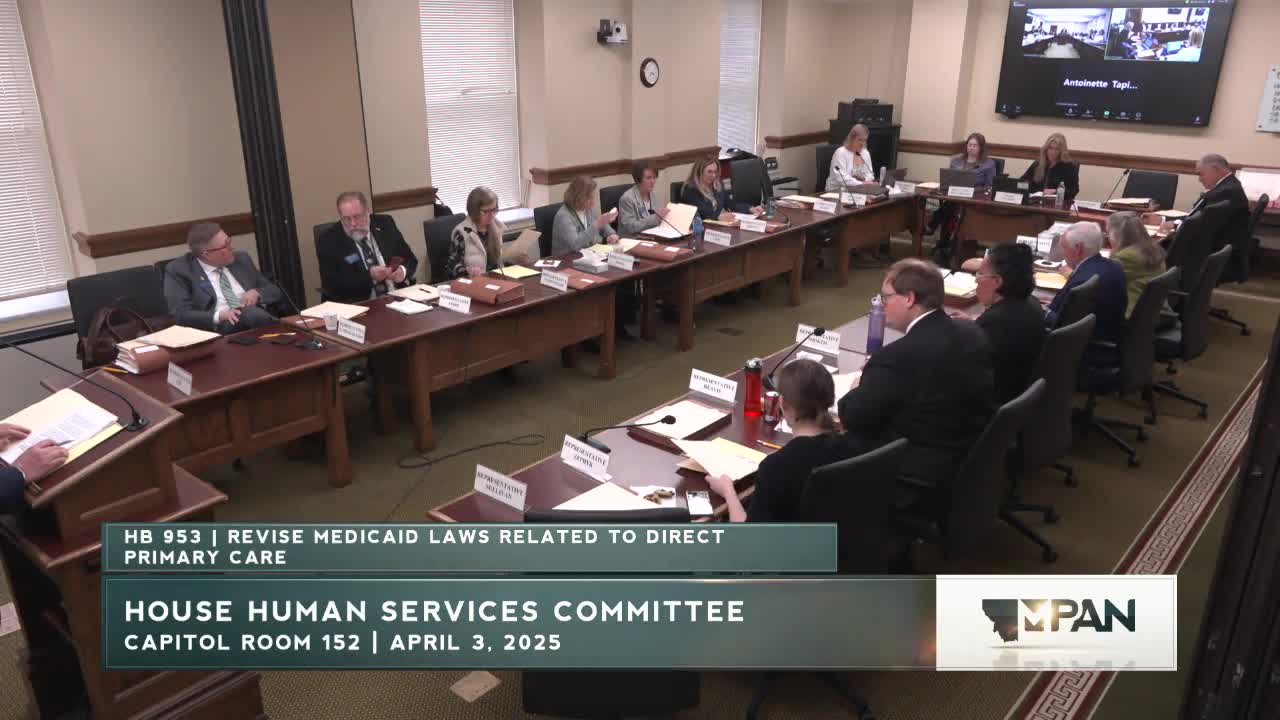Committee hears proposal to let Montana Medicaid explore direct primary care payments
April 03, 2025 | 2025 Legislature MT, Montana
This article was created by AI summarizing key points discussed. AI makes mistakes, so for full details and context, please refer to the video of the full meeting. Please report any errors so we can fix them. Report an error »

Representative Ed Butchery, the bill sponsor, introduced House Bill 9 53 to authorize the Department of Public Health and Human Services (DPHHS) to create rules allowing Medicaid to pay for direct primary care (DPC) membership arrangements on behalf of enrollees. "House bill 9 53 is a bill that deals with what is called direct primary care or DPC arrangements," he said, adding the 2021 Legislature has already authorized DPC in Montana and that DPC clinics in the state charge an average of about $77 per month.
The bill’s nut graf is procedural: it does not require the department to pay for DPC memberships but instead authorizes DPHHS to study and develop rules so the state Medicaid program could consider contracting for per-member-per-month DPC arrangements. "Nothing in HB 9 53 requires DPHHS to pay for the cost DPCs for enrollees. It simply allows the department to explore this as an option," Butchery said.
DPHHS administrator Mary Lemieux testified the agency supports the bill because it could expand access to primary care in a state where access is a concern. "The department supports House Bill 9 53," Lemieux said. Kendall Cotton of the Frontier Institute, a free-market think tank, also supported the bill but cautioned that "the devil is gonna be in the details," urging the department to avoid imposing traditional insurance billing requirements that would undermine DPC providers’ simplicity. Jean Branscum, CEO of the Montana Medical Association, said physicians appreciate an additional venue for primary care and urged a due-pass recommendation.
Committee members asked how prevention and routine screening would work under a DPC membership model. Proponents described DPC as a membership that typically covers preventative services, physicals and screenings, and in some cases arrangements with cash-pay imaging providers. Cotton said employers that purchase memberships for employees commonly pair that coverage with a high-deductible plan to cover catastrophic events.
DPHHS staff described how another state has approached Medicaid payments for DPC: Michigan uses a per-member-per-month contract for a suite of services rather than claims-based billing. Committee questioning focused on implementation questions the bill deliberately leaves to rulemaking: how to set standards, how to account for services not usually billed to insurers, and how to measure program effects. The sponsor said he had prepared a minor technical amendment to correct terminology.
The committee later took executive action on House Bill 9 53, adopting a terminology amendment (changing "direct primary care contracts" to "direct primary care agreements") and approving the bill as amended. The committee recorded the final committee vote as 18 in favor and 3 opposed in executive action later in the session.
The bill’s nut graf is procedural: it does not require the department to pay for DPC memberships but instead authorizes DPHHS to study and develop rules so the state Medicaid program could consider contracting for per-member-per-month DPC arrangements. "Nothing in HB 9 53 requires DPHHS to pay for the cost DPCs for enrollees. It simply allows the department to explore this as an option," Butchery said.
DPHHS administrator Mary Lemieux testified the agency supports the bill because it could expand access to primary care in a state where access is a concern. "The department supports House Bill 9 53," Lemieux said. Kendall Cotton of the Frontier Institute, a free-market think tank, also supported the bill but cautioned that "the devil is gonna be in the details," urging the department to avoid imposing traditional insurance billing requirements that would undermine DPC providers’ simplicity. Jean Branscum, CEO of the Montana Medical Association, said physicians appreciate an additional venue for primary care and urged a due-pass recommendation.
Committee members asked how prevention and routine screening would work under a DPC membership model. Proponents described DPC as a membership that typically covers preventative services, physicals and screenings, and in some cases arrangements with cash-pay imaging providers. Cotton said employers that purchase memberships for employees commonly pair that coverage with a high-deductible plan to cover catastrophic events.
DPHHS staff described how another state has approached Medicaid payments for DPC: Michigan uses a per-member-per-month contract for a suite of services rather than claims-based billing. Committee questioning focused on implementation questions the bill deliberately leaves to rulemaking: how to set standards, how to account for services not usually billed to insurers, and how to measure program effects. The sponsor said he had prepared a minor technical amendment to correct terminology.
The committee later took executive action on House Bill 9 53, adopting a terminology amendment (changing "direct primary care contracts" to "direct primary care agreements") and approving the bill as amended. The committee recorded the final committee vote as 18 in favor and 3 opposed in executive action later in the session.
View the Full Meeting & All Its Details
This article offers just a summary. Unlock complete video, transcripts, and insights as a Founder Member.
✓
Watch full, unedited meeting videos
✓
Search every word spoken in unlimited transcripts
✓
AI summaries & real-time alerts (all government levels)
✓
Permanent access to expanding government content
30-day money-back guarantee

